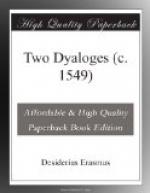we shall haue domes daye (as they call it) shortely.
Cannius. We haue therfore more nede to prepare
our selues in a redines agaynst that day, and that
with as moche spede as maye be possible. Poliphemus.
as for my part I loke and wayte styll euery day
for the myghty hande and power of christ. Cannius.
Take hede therfore that thou, when christ shall
laye his myghty hande vpon the be as tendre as waxe,
that accordynge to his eternall wyll he maye frayme
& fashyon the with his hande. But wherby I praye
the dothe these prophetes coniecture & gather that
the worlde is almost at an ende. Poliphe.
Bycause men (they saye) do the selfe same thinge
nowe adayes that they dyd, and were wont to do which
were lyuynge in the worlde a lytle whyle before
the deluge or Noyes floode. They make solempne
feastes, they banket, they quaffe, they booll, they
bybbe, they ryot men mary, ||wome are maryed, they
go a catterwallynge and horehuntinge, they bye,
they sell, they lend to vserie, and borowe vpon
vserie, they builde, kiges keepe warre one agaynst
another, preestes studie howe they maye get many
benefyces and promocios to make them selfe riche
and increase theyr worldly substaunce, the diuynes
make insolible sillogismus and vnperfyte argumetes,
they gather conclusyons, monkes and freers rune,
at rouers ouer all the world, the comyn people are
in a mase or a hurle burle redy to make insurrections,
and to conclude breuelie there lackes no euyll miserie
nor myschefe, neyther hoger, thyrst fellonie, robberie,
warre, pestilence, sedicio, derth, and great scarsytie
and lacke of all good thynges. And howe say
you do not all these thynges argue and sufficientlie
proue that the worlde is almost at an ende?
Cannius. Yea but tell me I praye the of all
thes hoole hepe of euyls and miseries whiche greueth
the ||moste? Poliphemus. Whiche thynkes
thou, tell me thy fansie and coniecture? Cannius.
That the Deuyll (god saue vs) maye daunce in thy
purse for euer a crosse that thou hast to kepe hi
for the. Poliphe. I pray god I dye and yf
thou haue not hyt the nayle vpon the head. Now
as chaunceth I come newly from a knotte of good
companye where we haue dronke harde euery man for
his parte, & I am not behynde with myne, and therfore
my wytte is not halfe so freshe as it wyll be, I
wyll dyspute of the gospell with the whan I am sobre.
Canni. When shal I se the sobre? Poli.
When I shall be sobre. Cannius. Whe wyll
that be? Poliph. When thou shalt se me,
in the meane season god be with you gentle Cannius
and well mot you do. Cannius. And I wyshe
to you a gayne for my parte that thou ware in dede
as valiaunt or pusaunt a felowe as thy name soundeth.
Poliphe. And bycause ye shall lose nothynge
at my ||hande with wyshynge I pray god that Cannius
maye neuer lacke a good can or a stoope of wine or
bere, wherof he had his name.
F I N I S
* * * * *
[C]The dialoge of thynges
and names.




